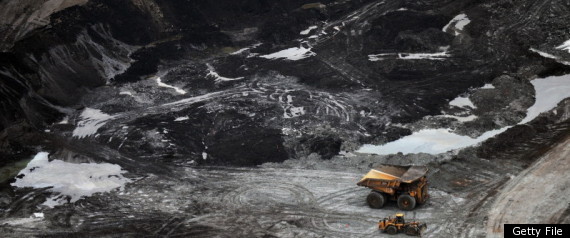 CALGARY, Alberta -- In the northern reaches of Alberta lies a vast reserve of oil that the U.S. views as a pillar of its future energy needs.
CALGARY, Alberta -- In the northern reaches of Alberta lies a vast reserve of oil that the U.S. views as a pillar of its future energy needs.China, with a growing appetite for oil that may one day surpass that of the U.S., is ready to spend the dollars for a big piece of it.
The oil sands of this Canadian province are so big that they will be able to serve both of the world's largest economies as production expands in the coming years. But that will mean building at least two pipelines, one south to the Texas Gulf Coast and another west toward the Pacific, and that in turn means fresh environmental battles on top of those already raging over the costly and energy-intensive method of extracting oil from sand.
Most believe that both will eventually be built. But if the U.S. doesn't approve its pipeline promptly, Canada might increasingly look to China, thinking America doesn't want a big stake share in what environmentalists call "dirty oil," which they say increases greenhouse gas emissions.
Alberta has the world's third largest oil reserves, more than 170 billion barrels. Daily production of 1.5 million barrels from the oil sands is expected to nearly triple to 3.7 million in 2025. Overall, Alberta has more oil than Russia or Iran. Only Saudi Arabia and Venezuela have more.
Alberta is one of the few places where oil companies can invest, as the majority of the world's oil reserves are controlled by national governments. Only 22 percent of the total world reserves are accessible to private sector investment, 52 percent of which is in Alberta's oil sands, according to the Canadian Association of Petroleum Producers.
Canada's only major oil export market is the U.S. But with the product of oil sands and pipeline delivery to the U.S. under perennial clouds of environmental objections, and with Asian demand growing, this country wants to diversify its market, and China is eager to oblige.
Sinopec, a Chinese state-controlled oil company, has a stake in a $5.5 billion plan drawn up by the Alberta-based Enbridge company to build the Northern Gateway Pipeline from Alberta to the Pacific coast province of British Columbia. Alberta Finance Minister Lloyd Snelgrove met this month with Sinopec and CNOOC, China's other big oil company, and China's largest banks.
Full Article
Source: Huffington
No comments:
Post a Comment